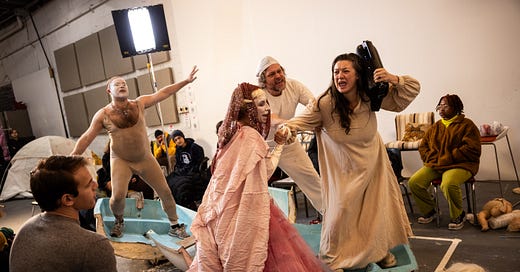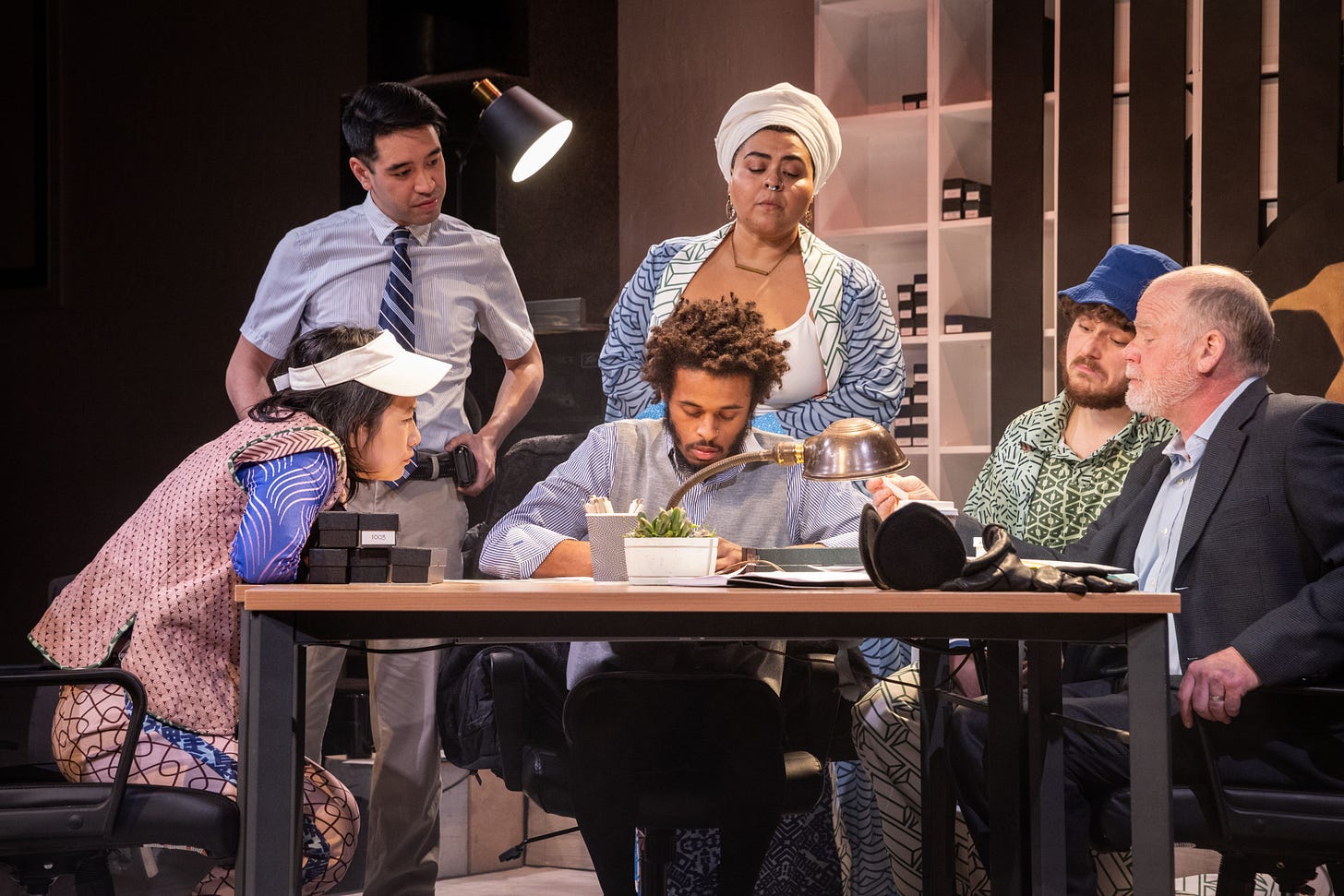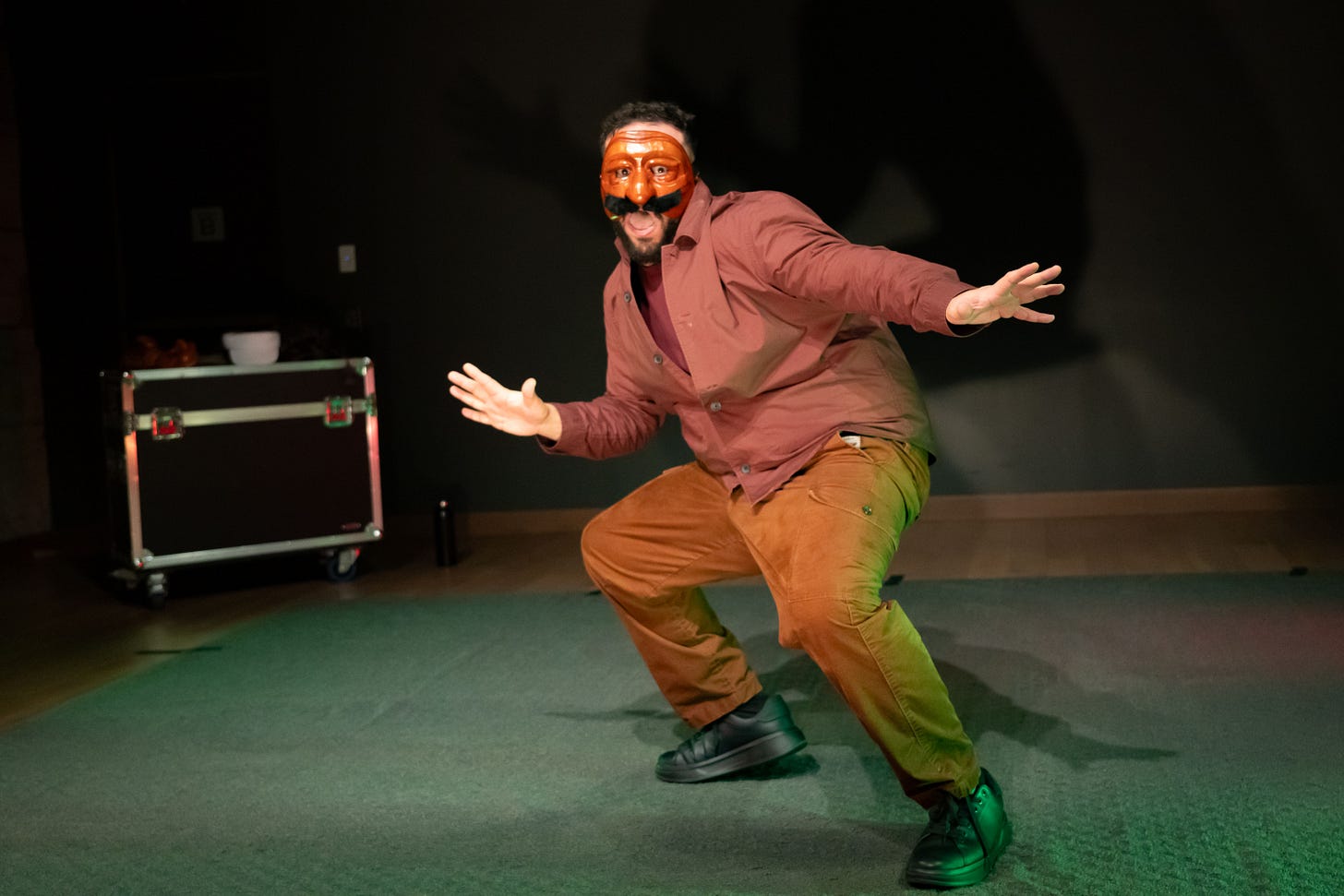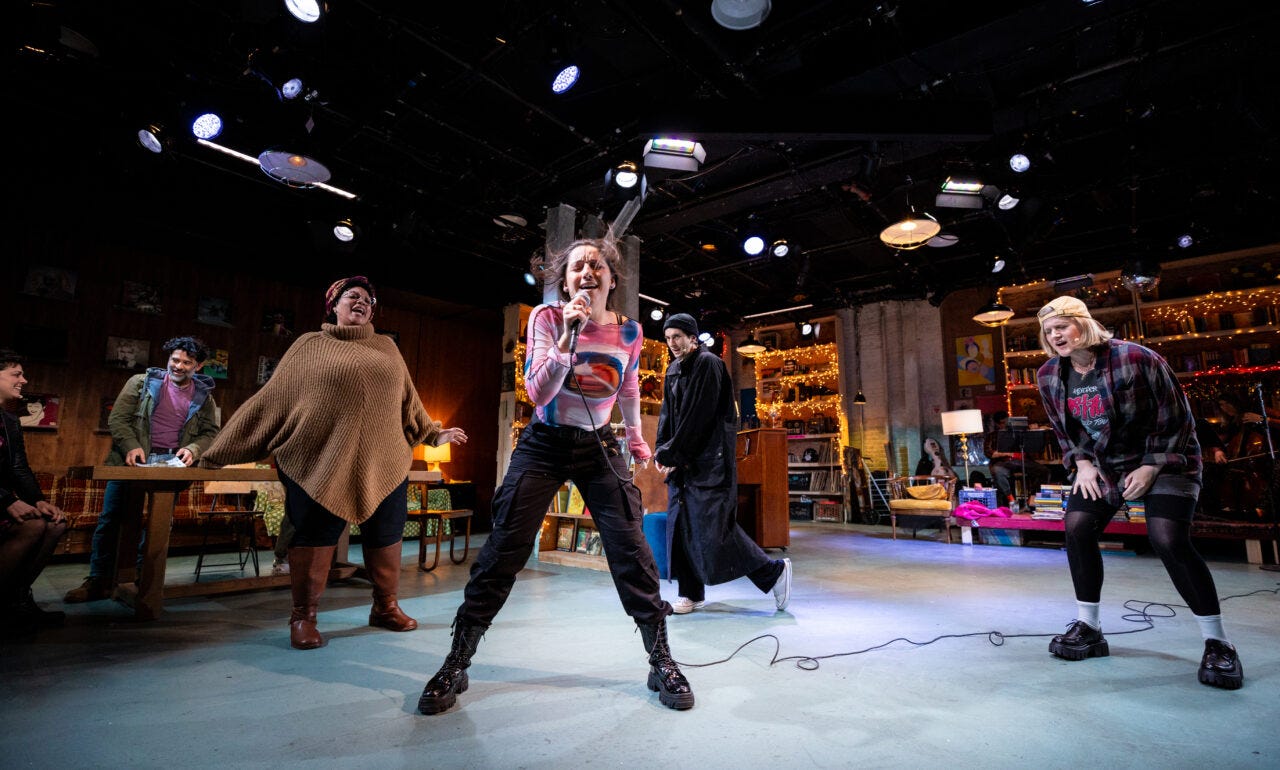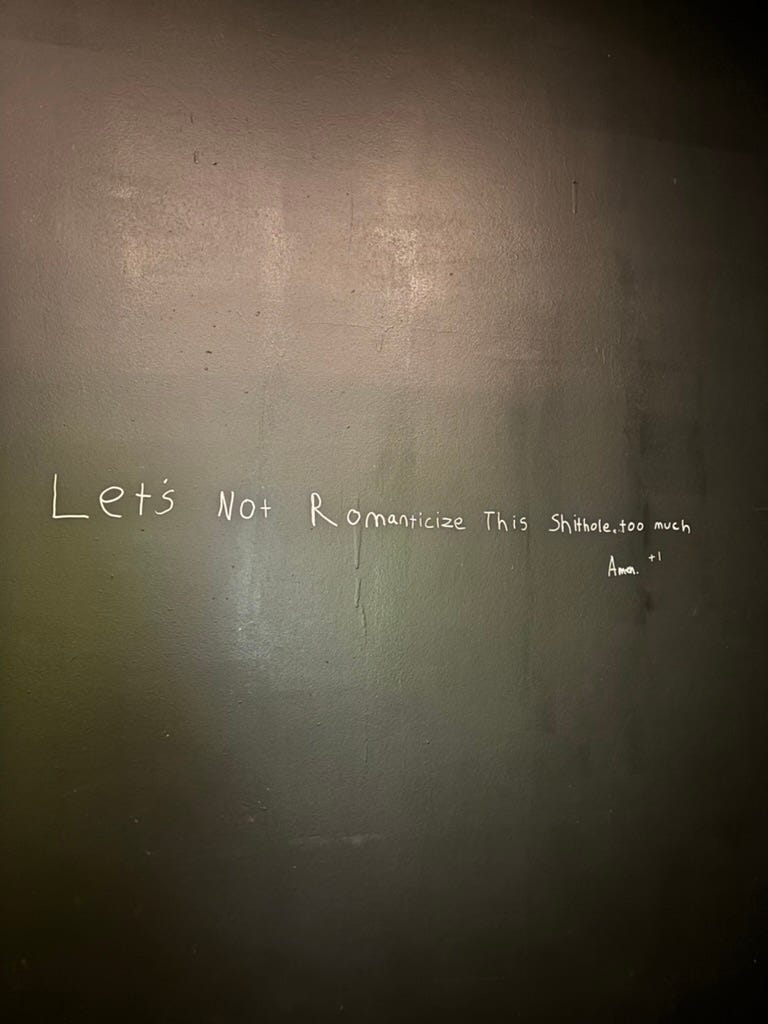Marie Antoinette
Presented by Chemistry Creative, as part of Under the Radar
“Please note: This production includes loud noises, violence, nudity and disturbing content. It is recommended for mature audiences only. A small dog will also be in the space.”
Receiving this advisory ahead of Ann Liv Young’s Marie Antoinette, I worried: “What are they going to do to this dog?” But little Frida, it turned out, was the only living thing in the Chemistry Creative space that Young intended to treat with any kindness.
Young’s deranged piece is introduced as a deconstruction of Marie Antoinette & Louis XVI, but that show never really begins. Our self-involved director and lead performer keeps getting waylaid either lambasting her two performers (Alex Sabina & Tom Ruth, both astonishing), ranting about her trauma, or hurling abuse at unsuspecting audience members.
“Are you an actual retard?” Young questioned one patron at my performance, who grew tearful as the harassment continued. (The use of that term prompted another person to stand up and head for the door.) Young is an infamous provocateur, well known for audience badgering that borders on cruelty. Later that night, Sabina grabbed and physically shook two audience members to demonstrate her insanity—seated further back, I was fortunate to only have food thrown at me.
Young’s target with Antoinette is (I think) our uncomfortable packaging and commodification of individual trauma in modern art-making. “These are two mentally ill people who are performing,” Young bellows at multiple points, indicating Sabina and Ruth. “Is that not enough for you people?” The point is not subtle, but for at least an hour, it’s funny. In an excruciating kind of way. Young’s escalating awfulness is a horrible thrill; the staging a precisely calibrated, carefully controlled litany of chaos.
After a while, though, the point has been made. Young attempts to shift gears, letting Sabina and Routh reclaim the show and perform for real. But the energy has deflated, and that second hour feels more like an exercise in punishment—how long will you sit there, foolish audience, and let us keep rambling on? Even if that’s the idea, it’s a far less interesting one.
Neck Down
Presented at We Are Here, as part of The Exponential Festival
Set in a nondescript New York office on the morning of an ancient coin auction, playwright Nic Adams’ kaleidoscopic piece examines divides of age, race and class in contemporary commerce and artmaking. To fully represent the office’s four inhabitants, Adams splits out each character’s “real” selves from their internal monologue, with two performers working side-by-side.
It’s a neat idea, but Adams’ writing is unfocused, jumping between grand thematic questions and never establishing a narrative grounding. Without a clear sense of who each individual is in the real world, the “inner self” monologues can’t find much impact. Adams’ real-world scenes are actually far more engaging, particularly an unexpected connection that forms between a stuffy coin collector and the office temp. Marissa Joyce Stamp’s messy staging battles the open-layout space, We Are Here, which is unsuitable for a traditionally staged play.
Long, thoughtful direct-address monologues are a tempting device for playwrights, but too often a crutch—as also recently demonstrated by Sarah Mantell’s dreary In The Amazon Warehouse Parking Lot, a play bogged down by reams of direct address. It tends to be more interesting (and a greater challenge for the writer) to deal in the tricky, nuanced dynamics of how real humans struggle and fumble to communicate in our actual world.
The Horse of Jenin
Presented by LaMaMa Experimental Theatre Club in association with GOH Productions, as part of Under the Radar
“My stand-up,” sighs comedian and performer Alaa Shehada early in his terrific one-man show, “has become interesting comedy.”
A sharp comic and superb performer, Shehada also happens to be Palestinian—born and raised in the city of Jenin, in the Israeli-occupied West Bank. Shehada’s moving piece walks the impressive (and unenviable) tightrope forced by its context, putting the laughs first while never ignoring the cruel realities of life under Israeli occupation.
Shehada tells the story of the “Jenin Horse,” a sculpture created in 2003 by artist Thomas Klipper to commemorate 52 Palestinians killed in a 2002 Israeli offensive. The sculpture becomes an unexpected source of inspiration for the city’s residents, many of whom Shehada brings to life through expertly over-the-top mask work.
The piece succumbs to preachiness only near its end, underlining a point that keen humor had already conveyed: the resilience and humanity of the Palestinian people. But given all that Jenin has endured and lost, one can hardly blame him Shehada for driving the message home.
Eat the Document
Presented at HERE Arts Center, as part of PROTOTYPE
A gentle, contemplative new opera, Eat the Document is an examination of radical protest in America based on the 2006 novel by Dana Spiotta. Moving between parallel storylines in the 1970s and 90s, the piece depicts the fallout of a violent action gone wrong over the ensuing decades.
John Glover’s compositions are elegant and stirring, but Kelly Rourke’s libretto proves mostly listless, straining to include a litany of perspectives and supporting characters. Kristen Marting’s swift-footed staging keeps things moving clearly and seamlessly, but Document is never emotionally engaging.
A moment, though, for Peiyi Wong’s wondrous set, a meticulously detailed collision of 70s and 90s aesthetics; and the always invaluable Paul Pinto, who brings a wonderfully wry humor to Nash, a disillusioned radical searching for a sense of purpose.
Find Your Eyes
Presented at The Iris Cantor Theatre, as part of Under the Radar
Benji Reid crafts a wholly unique theatrical language in Find Your Eyes, a blending of live photography and stagecraft unlike anything I’ve seen. The stage becomes Reid’s studio as we watch the British photographer (his back always to the audience) rigorously pose and re-pose the obliging models. The resulting shots, projected for our judgment seconds after capture, begin modestly but grow into magnificent Afro-futurist imaginings.
A sight to behold, Find Your Eyes does nonetheless hit on an intellectual level more than an emotional one. That’s by design, to an extent—Reid has placed his own process in between the audience and the final product. Yet pre-recorded narration makes clear that Reid is working through his own struggles around depression and loss, personal elements that come through only at a remove.
Expanding out from Reid’s own journey, however, Find Your Eyes does find potency in his concept of “conflict photography,” here defined as the wounds of everyday existence—specifically for Black bodies fighting and surviving in a hostile world.
Positive Vibration Nation
Presented at HERE Arts Center, as part of PROTOTYPE
An incomprehensible rock opera from composer, director and performer Sol Ruiz, Positive Vibration Nation is a sci-fi adjacent journey through past and future visions of Miami. Our primary setting is a post-apocalyptic, Mad Max-style wasteland version of the city in the year 3050—that is until the band abruptly shoots off into space, for reasons unclear.
Weird is fine, but there’s no defending lyrics like: “There will be times when the going gets tough/You gotta step your game up'“ Or, more offensively: “Everything matters/Because everything is matter/And everything is everything.”
Near the close of an excruciating 60 minutes, Ruiz questioned her suffering crowd: “Can you feel the positive vibrations?” She was met with a few sad “Whoops” but, mostly, a deadened silence.
Soho Rep Is Not A Building
Presented at Walkerspace, as part of Under the Radar
It’s hard to imagine a more profound statement on New York theatrical real estate than the single sentence scrawled on the walls of our departed Walkerspace: “Let’s not romanticize this shithole too much.”
Soho Rep opened up Walkerspace to allow theatergoers a final farewell to the ratty, 65-seat space (the company continues its programming, for now at Playwrights Horizons). Wandering the empty building at noon on a Friday, dressing rooms and backstage included, I accepted the horrible truth: Walkerspace is, indeed, a shithole. This space I have so revered, where I’ve felt so much comfort, ridden the highs and lows of Soho Rep’s essential work, is a total fucking dump.
It’s an oddly comforting realization. When any theater company departs its longtime home, I struggle with the insistent messaging of, “We are more than just a building.” Sure, of course—but the building is integral and, for the audience, not easily forgotten. Yet wandering the mangy halls of Walkerspace, I felt strangely hopeful. It will be okay. We can find ourselves another shithole.

